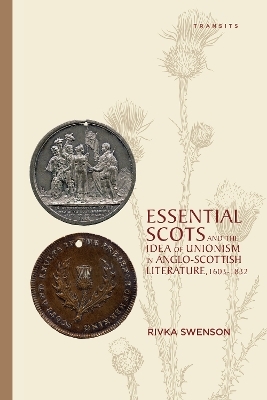
Essential Scots and the Idea of Unionism in Anglo-Scottish Literature, 1603–1832
Bucknell University Press (Verlag)
978-1-61148-678-0 (ISBN)
- Titel z.Zt. nicht lieferbar
- Versandkostenfrei innerhalb Deutschlands
- Auch auf Rechnung
- Verfügbarkeit in der Filiale vor Ort prüfen
- Artikel merken
Discussing writers such as Bacon, Defoe, Smollett, Johnson, Macpherson, Ferrier, and Scott along with lesser-known or forgotten popular authors (and ballads, transparencies, newspapers, joke books, cant dictionaries, political speeches, histories, travel narratives, engravings, material artifacts such as medals and snuffboxes), Essential Scots describes the years 1603 to 1832 as a crucial period in British history. Paradoxically, the political and cultural exploration of ideas about “unionism” in relation to a supposed “essential Scottishness” participated in the increasing prominence of both description and the “individual” in nineteenth-century Scottish literature; Swenson persuasively concludes that essential Scottishness (as both “identity” and symbolism) was refigured to mediate a national synthesis between the emergent individual and the nascent British nation—as well as the naturalized, even de-politicized, literary synthesis of particulars within putatively analogous narrative wholes.
Rivka Swenson is associate professor of English at Virginia Commonwealth University.
Acknowledgments
List of Illustrations
List of Abbreviations
Introduction
Part I: Essential Scottishness and the Form of Original Anglo-Scottish Discontent
One: Writing Anglo-Scottish Unionism and its Discontents in 1603 and 1707: Francis Bacon, Daniel Defoe, and English Anxieties of Narration
Two: Writing Reunion, Rewriting Union for the Atomic Scot: Tobias Smollett’s Traveling Types after the ’45 and Seven Years War
Three: Writing Revolution as Essential Recovery: Samuel Johnson’s Return to Scotland after Ossian
Part II: Unionism and the Challenge of the Individual in Early Nineteenth-Century Scottish Writing
Four: Individual Concerns, the Mock-Gothic, and Marriage Trouble: Anglo-Scottish Self-Difference in Susan Ferrier’s Laboratory
Five: Describing the Subnational Hinge in 1822: Robert Mudie and the Aesthetic Politics of the Synthetic British Text
Coda: Walter Scott and the Legacy of Chosen Scottishness
Bibliography
Index
About the Author
| Erscheinungsdatum | 08.01.2016 |
|---|---|
| Verlagsort | Cranbury |
| Sprache | englisch |
| Maße | 161 x 238 mm |
| Gewicht | 699 g |
| Themenwelt | Geschichte ► Allgemeine Geschichte ► Neuzeit (bis 1918) |
| Geisteswissenschaften ► Geschichte ► Regional- / Ländergeschichte | |
| Geisteswissenschaften ► Sprach- / Literaturwissenschaft ► Anglistik / Amerikanistik | |
| Geisteswissenschaften ► Sprach- / Literaturwissenschaft ► Literaturgeschichte | |
| ISBN-10 | 1-61148-678-5 / 1611486785 |
| ISBN-13 | 978-1-61148-678-0 / 9781611486780 |
| Zustand | Neuware |
| Haben Sie eine Frage zum Produkt? |
aus dem Bereich


